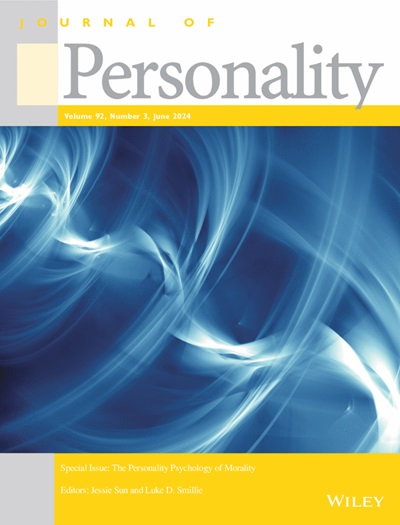The Moderating Effect of Cultural Tightness on the Influence of Personal Values and Social Norms on Behavior
IF 2.7
1区 心理学
Q1 Psychology
引用次数: 0
Abstract
IntroductionBehavior is not solely determined by individual dispositions or situational demands, but by the dynamic interplay between them. The current research investigates the contextual sensitivity of behavioral determinants by examining how personal values and social norms influence behavior across tight and loose cultural contexts.MethodWe either measured (Study 1:文化紧密度对个人价值观和社会规范对行为影响的调节作用
行为不仅仅是由个人倾向或情境需求决定的,而是由它们之间的动态相互作用决定的。目前的研究通过考察个人价值观和社会规范如何在紧密和松散的文化背景下影响行为来调查行为决定因素的语境敏感性。方法通过测量(研究1:n = 762)或操纵(研究2:n = 564)文化紧密度,考察其如何调节实验诱导的个人价值观和社会规范对环境行为的影响。结果假设在规范弱、偏差容忍度高的宽松情境中,只有个人价值观对行为有影响,而社会规范对行为的影响与控制条件没有差异。与我们的假设相反,在以强规范和低偏差容忍度为特征的严格环境中,与控制条件相比,个人价值观和社会规范都影响了行为,这可能是由于它们的可及性增强了。在这两项研究中,关于行为意图的结果是高度一致的;然而,它们并没有转化为公开的行为。文化紧密性提供了一个全面的理论框架,以细致地理解背景因素如何塑造个人与社会力量对人类行为的相对影响。
本文章由计算机程序翻译,如有差异,请以英文原文为准。
求助全文
约1分钟内获得全文
求助全文
来源期刊

Journal of Personality
PSYCHOLOGY, SOCIAL-
CiteScore
9.60
自引率
6.00%
发文量
100
期刊介绍:
Journal of Personality publishes scientific investigations in the field of personality. It focuses particularly on personality and behavior dynamics, personality development, and individual differences in the cognitive, affective, and interpersonal domains. The journal reflects and stimulates interest in the growth of new theoretical and methodological approaches in personality psychology.
 求助内容:
求助内容: 应助结果提醒方式:
应助结果提醒方式:


